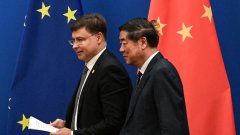China has opened another channel for international investors to invest in cash in the country's stock market, hoping to promote exchanges and trading funds (ETFs) industry (ETF) industry with a small starting time in China.
According to the Wall Street Journal, the securities regulatory agencies in Hong Kong and mainland China have approved dozens of ETFs into the interconnection mechanism of the mainland and Hong Kong stock markets.Most of these funds are listed in Shanghai or Shenzhen, including products named "Innovation Pharmaceutical ETF" and "Chip ETF", and funds that track the Shanghai and Shenzhen 300 large stock indexes and other broader market benchmark indexes.
According to the data provided by the mainland and the Hong Kong Exchange, the first week after the above ETF was included in the interconnection mechanism, the transaction was mild, but the transaction volume in the past week has increased more than three times to 3.14$ 100 million (the same below, about S $ 439 million).Most of the recent transactions involve ETFs listed in Hong Kong, which holds stocks listed in Hong Kong.
Goldman Sachs's research analyst predicts that in the next ten years, if more ETF products are included in this interconnection mechanism, it may promote up to 130 billion US dollars of funds to flow into ETFs listed on the mainland, and in addition, it will also be, and in addition, it will also be.Promoting $ 50 billion in ETFs listed in Hong Kong.About 83 ETFs and four ETFs listed on the mainland are currently incorporated into this interconnection mechanism. The total assets of these ETF management are about $ 120 billion.
There are about 700 ETFs on the mainland, with a total asset size of about 215 billion US dollars.Most of these EFT are passive management funds holding stocks in domestic listed companies.As of the end of May, there were about 130 ETFs in Hong Kong, with a total asset size of 54 billion US dollars.
In contrast, the size of the US ETF market has reached $ 7.14 trillion. Some of the largest common funds are low -cost funds that track the S & P 500 Index or Russell 3000 Index.Although passive investment has increased in China in recent years, most investors still like to buy and sell individual stocks or buy active management public funds.
It is reported that the asset management company hopes that the ETF interconnection can help to change this situation.Overseas investors now have more domestic investment varieties to choose from, and domestic investors in China can be easier to get involved in funds that hold Alibaba and Baidu such as Hong Kong, such as Hong Kong.
The Wall Street Journal quoted the Director of the Investment Department of Huaxia Fund Management Co., Ltd. and said that by investing in China ETF, investors can obtain investment opportunities for specific industries without comprehensive research on individual stocks.She added that some foreign investors have limited research on domestic stocks.
Huaxia Fund provides 10 ETFs through this interconnection mechanism.The company's funds focusing on Chinese food and beverages, new energy vehicles and semiconductor industries have already inflows.As a word, there are more foreign investors interested in a carbon neutral and theme.
Since the stocks of Chinese Internet companies such as Alibaba and JD.com have not joined the interconnection mechanism, Chinese investors cannot directly purchase the stocks of these companies, and ETFs are included in the mechanism.Buy channels.They can buy the Hong Kong listing ETF that tracks the Hong Kong Hang Seng Technology Index and has an openness to these companies.
The deputy leader of Southern Dongying Asset Management Co., Ltd. said that the first week after the ETF interconnection was launched, about 85%of the funds flowing from the mainland to Hong Kong entered the management of her companyHang Seng Technology ETF.She said that more investors are expected to be keen to invest in ETFs. It is convenient to invest in ETFs, and ETFs are not distributed through traditional channels such as banks and wealth management consultants.
Chord also said that once this product grows up, the growth rate will be index level.
Over time, the funds flowing into ETFs have continued to increase, and Chinese technology companies listed in Hong Kong will benefit.
The landlord of the UBS Group's global market in China said that the degree of activity and liquidity of China's investor group may be the second highest, second only to the United States, so it is easier for mainland investor groups to be easier to be easier to be more likelyIt will be an additional item when contacting the Hong Kong stock market.The landlord Ming also said that this may also increase Hong Kong's attractiveness as a listing location.
Asset management company Rayliant Global Advisors chief investment officer Jason HSU said his company plans to launch more eligible ETFs in Hong Kong to attract mainland investment.HSU also said: "There are a lot of wealth in mainland China to find some global diversified investment. Mainland asset management institutions cannot meet the demand for these global assets."
In the initial mainland and Hong Kong stock markets,After nearly eight years after the launch of the transaction interoperability mechanism, ETF joined the interconnection mechanism.According to the initial mechanism, Hong Kong and mainland investors can shares within the scope of the other market transaction regulations.According to the data provider's data, so far, the net inflow of the northern direction of the interconnection mechanism has reached $ 250 billion.




